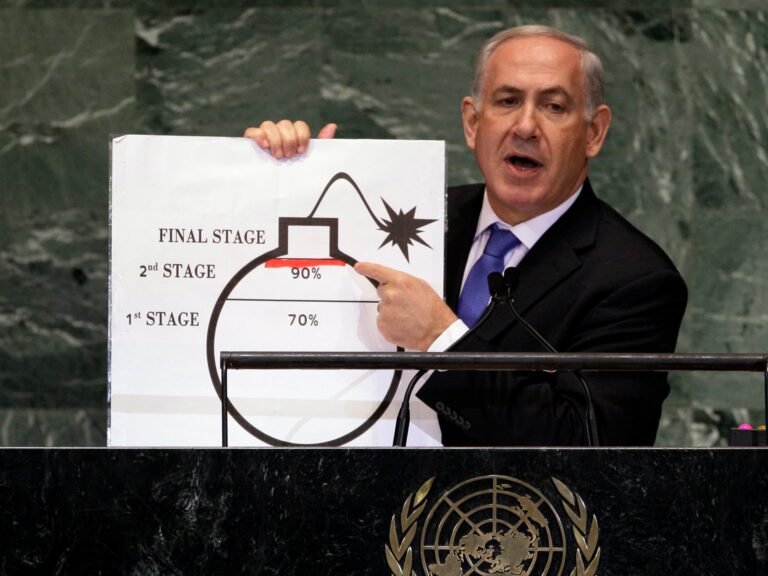Since its founding in 1948, Israel’s prime ministers have sought to leave legacies that would outlast them — some through war, others through diplomacy, and a few through historic blunders. David Ben-Gurion secured the state’s independence and built its foundational institutions. Golda Meir presided over a war that cost her office. Menachem Begin signed peace with Egypt while expanding illegal settlements. Yitzhak Rabin was assassinated for trying to make peace with the Palestinians.
Each leader, in some way, left their mark. But none has ruled as long – or as divisively – as Benjamin Netanyahu. And now, more than ever, the question is not just what kind of legacy he wants to leave, but what legacy he is actually creating.
In 2016, I argued that the Arab world had effectively crowned Netanyahu “King of the Middle East” — a title that reflected his success in positioning Israel as a regional power without making any concessions to the Palestinians. Today, I believe he sees an opportunity not only to consolidate that title, but to reshape Israel’s regional position permanently — through force, impunity, and a strategy rooted in securitised dominance.
Since his first term, Netanyahu has insisted that Israel’s security must override all other considerations. In his worldview, a Palestinian state is not merely incompatible with Israel’s security; it is an existential threat. Even were such a state to be created, Netanyahu has made clear that Israel must retain what he calls “security sovereignty” over all of historic Palestine.
This has never been mere rhetoric. It has shaped his every major decision, none more so than the current war on Gaza. The assault has levelled entire neighbourhoods, killed tens of thousands of Palestinians, displaced most of its two million people, and created an unprecedented humanitarian catastrophe.
Israel stands accused by human rights groups and United Nations agencies of committing war crimes, ethnic cleansing, and genocide. It is facing genocide charges, supported by multiple countries, at the International Court of Justice. The International Criminal Court has also issued arrest warrants for Netanyahu and his former defence minister, Yoav Gallant, for alleged war crimes and crimes against humanity, including the use of starvation as a weapon of war.
Yet Netanyahu presses on, arguing that Gaza must never again pose a threat to Israel, and that the destruction is necessary to secure the country’s future.
This logic does not stop at Gaza. He has used similar arguments to justify Israel’s attacks on Lebanon, including targeted strikes on Hezbollah figures and the attempted assassination of the group’s leader, Hassan Nasrallah.
Using the same rationale, Israel has also launched strikes in Yemen and made clear that it will act in Iraq whenever and wherever it deems necessary.
The security argument has likewise been used to justify the continued occupation of Syrian territory and is currently invoked to legitimise ongoing attacks on Iran, ostensibly to prevent it from acquiring nuclear weapons and to degrade its missile and drone capabilities.
In every case, the same narrative is repeated: Israel cannot be safe unless its enemies are broken, its deterrence unchallenged, and its dominance undisputed. All dissent, disagreement, or resistance — whether military, political, or even symbolic — is cast as a threat to be eliminated.
Even Netanyahu’s diplomatic efforts follow this logic. The Abraham Accords, signed with the UAE, Bahrain, and Morocco during his premiership, were hailed as peace deals but functioned primarily as instruments of regional alignment that marginalised the Palestinians. For Netanyahu, normalisation is not a path to peace — it is a way to cement Israel’s position while avoiding a just resolution to the occupation.
What, then, is the legacy Netanyahu seeks?
He wants to be remembered as the prime minister who crushed all resistance to occupation, permanently ended the idea of a Palestinian state, and enshrined Israel’s dominance in the Middle East through sheer force. In his vision, Israel controls the land, dictates the rules, and answers to no one.
But history may remember him differently.
What Netanyahu calls security, much of the world increasingly sees as systemic violence. The global response to the war on Gaza — millions marching in protest, international legal action, growing boycotts, and diplomatic downgrades — suggests that under his leadership, Israel is not gaining legitimacy but losing it.
Even among its allies, Israel faces growing isolation. While the United States continues to provide diplomatic cover, terms like “apartheid”, “ethnic cleansing”, and “settler colonialism” are no longer confined to fringe activism. They are entering mainstream political discourse and shaping public consciousness, particularly among younger generations.
Many commentators argue that Netanyahu is clinging to power merely to avoid prosecution for corruption or accountability for the failures of the October 7, 2023, attacks on Israel. But I believe this analysis misses a deeper truth: that he sees this moment — this war, this absence of accountability — as a historic window of opportunity. In his mind, this is legacy work.
The tragedy is that in pursuing this legacy, he may achieve the opposite of what he intends. Not a stronger Israel, but a more isolated one. Not a secure homeland, but a state increasingly seen as a violator of international norms. Not a legacy of strength, but one of moral and political collapse.
Netanyahu will be remembered. Today, as Gaza burns and Iran faces strike after strike, there is no longer any doubt about that. The only question is whether his legacy will be one of national security, or one that leaves Israel more alone, more condemned, and more precarious than ever before.
The views expressed in this article are the author’s own and do not necessarily reflect Al Jazeera’s editorial stance.


